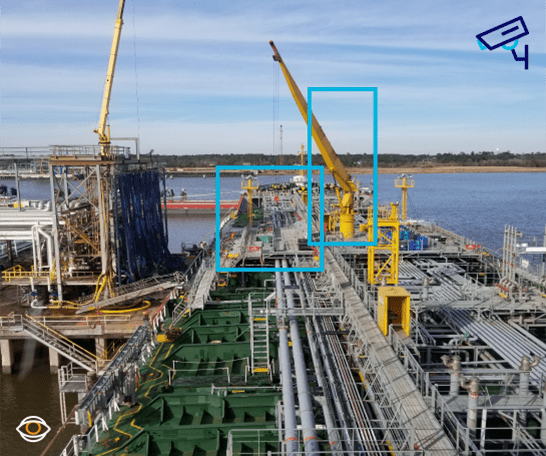at.inc/portfolio-spotlight
How Shipin.ai is Transforming Maritime Fleet Management
Regulatory compliance has become an undeniable reality for industries worldwide, particularly in "heavy" sectors like fleet management. With governments and international bodies refining standards to ensure safety, security, and operational efficiency, companies must adapt to increasingly stringent requirements. Often, this creates an entry point for high-tech solutions that not only help businesses comply but also transform their operations, offering unparalleled added value.
Tech startups have already revolutionized various industries, from manufacturing to logistics and construction. For example, automation and IoT technologies in factories help companies comply with workplace safety standards while simultaneously improving productivity and reducing downtime.1 Similarly, advanced analytics in agriculture enable farmers to meet environmental regulations while optimizing crop yield and resource use.2 These examples highlight the dual benefit of compliance and value creation—a trend we see reflected in fleet management technologies like Samsara.
Samsara (NYSE: IOT) has become a prime example of how technology can address regulatory challenges while delivering operational advantages. Its solutions help fleet operators meet requirements like the ELD mandate in the U.S. and Canada, which ensures accurate tracking of hours of service, while also offering seamless connectivity and operational efficiencies.3 Samsara’s platforms go beyond compliance by providing fleet-wide visibility, helping businesses make data-driven decisions and optimize performance. This ability to align regulatory needs with enhanced operational insight sets the stage for transformative innovation across industries.
The Importance of the Maritime Sector
While technology has reshaped many heavy industries, the maritime sector—specifically maritime fleet management—has remained relatively unchanged over the past 50 years. As the backbone of global physical trade, maritime fleets handle over 80% of the world’s trade by volume, making them critical to the functioning of nearly every industry.4 Yet, during crises like COVID-19, we saw how vulnerable and outdated this sector can be, with port backlogs and inefficiencies impacting supply chains worldwide.5 The sector is overdue for technological transformation, and the growing focus on safety and compliance is accelerating this shift.
The Growing Demand for Advanced CCTV in Maritime
Just as fleet operators in land-based transportation are finding value in IoT technologies, the maritime industry is now experiencing a similar trend. A growing emphasis on safety, security, and accountability has spurred demand for advanced CCTV systems on ships. These systems are increasingly seen as essential—not only for meeting safety regulations but also for enhancing operational visibility, supporting risk management, and enabling proactive decision-making.
Recent maritime regulations reflect this trend. Authorities around the world are mandating CCTV systems to prevent incidents, improve investigation capabilities, and enhance navigational safety. Examples include:
U.S. SASH Compliance: Under the Sexual Assault and Sexual Harassment (SASH) provisions of the Jones Act, U.S. regulations require CCTV monitoring in accommodation areas to deter misconduct and ensure safer working environments.
Australian Ports (Capesize Vessels): Starting in January 2025, Capesize vessels operating in Pilbara Ports, including Port Hedland, must install CCTV systems at the steering gear, providing visibility to the bridge for safer navigation.
Proposed Indian Regulations:6 India’s Directorate General of Shipping is moving to mandate CCTV systems on foreign-flagged vessels visiting Indian ports. This regulation would require CCTV coverage in operational areas to enhance safety, support investigations, and ensure onboard security.
These regulations represent a global shift, where advanced CCTV systems are becoming standard expectations. However, their value extends far beyond compliance.
The Limitations of CCTV Data—and How Shipin.ai Overcomes Them
While CCTV systems offer significant benefits, they also introduce challenges. Continuous recording on multiple cameras generates vast amounts of data, making it difficult to analyze and act on in real time. For fleet operators, manually reviewing footage is impractical, especially when timely insights are needed to prevent incidents or improve operations.
Shipin.ai addresses these challenges by turning CCTV systems into powerful tools for insight and innovation. Here’s how:
Intelligent Filtering and Critical Alerts: Shipin.ai’s platform uses advanced algorithms to filter out routine footage and surface critical incidents and macro-level patterns. This ensures that fleet operators focus only on what matters, enabling faster responses to risks and inefficiencies.
Fleet-Wide Insights: By aggregating data across an entire fleet, Shipin.ai provides operators with a comprehensive view of safety KPIs, operational trends, and progress over time. This transforms compliance data into actionable insights, supporting continuous improvement.
Planning Ahead, Not Just Reacting: Shipin.ai enables proactive management by analyzing fleet-wide metadata. Operators can use these insights to train crews, refine protocols, and make data-driven decisions, fostering a culture of safety and long-term risk reduction.
From Reactive to Proactive Fleet Management
The journey with Shipin.ai often begins with regulatory compliance but quickly evolves into a strategic advantage. By centralizing critical incident data and extracting actionable insights, Shipin.ai empowers fleet managers to move beyond reactive safety measures. Instead, they can adopt a proactive approach to operational management, using data to enhance productivity, safety, and decision-making on a global scale.
In an industry traditionally slow to adopt new technologies, compliance-driven adoption can be a catalyst for transformation. By addressing regulatory demands and turning data into insights, Ship isin.ai not just helping maritime companies meet today’s standards—it’s enabling them to build a safer, smarter, and more efficient future.


